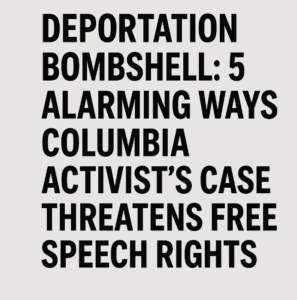Deportation Bombshell: 5 Alarming Ways Columbia Activist’s Case Threatens Free Speech Rights
A federal judge ruled to deport Mahmoud Khalil, a Palestinian activist and Columbia University graduate, citing a 1952 law that allows removal of noncitizens deemed a threat to U.S. foreign policy—a claim supported solely by a memo from Secretary of State Marco Rubio. Khalil, a green card holder married to a U.S. citizen expecting their child, was detained 1,000 miles from home after organizing pro-Palestinian protests.
Critics condemn the ruling as politically motivated, arguing it weaponizes immigration law to punish dissent, bypassing evidence and due process. The case highlights vulnerabilities for immigrants engaged in activism, as courts accepted unproven allegations linking Khalil’s advocacy to antisemitism. Legal experts warn it sets a dangerous precedent, enabling deportations based on ideology rather than tangible threats. Khalil’s attorneys plan appeals and asylum claims, while parallel federal proceedings could delay deportation.
The outcome may redefine free speech protections for noncitizens and embolden efforts to silence critics of U.S. foreign policy.

Deportation Bombshell: 5 Alarming Ways Columbia Activist’s Case Threatens Free Speech Rights
A federal immigration judge’s ruling to deport Mahmoud Khalil, a Palestinian activist and Columbia University graduate student, has sparked outrage and raised urgent questions about the weaponization of immigration law to suppress dissent. The case, which hinges on a rarely invoked 1952 statute, underscores tensions between national security claims and constitutional freedoms—a conflict with profound implications for activists, immigrants, and free speech advocates.
The Case at a Glance
Khalil, a lawful permanent resident (green card holder) married to a U.S. citizen expecting their first child, was arrested by ICE in March 2025. The government alleges his pro-Palestinian activism at Columbia—including organizing protests urging the university to divest from Israel—poses “serious adverse foreign policy consequences.” Secretary of State Marco Rubio cited this claim in a memo, which became central to the deportation ruling. Despite Khalil’s legal team rebutting allegations of antisemitism and misrepresentation on his visa application, Judge Jamee Comans relied solely on Rubio’s unsubstantiated assertions, bypassing traditional evidentiary standards.
Legal Precedent or Political Tool?
The government invoked Section 237(a)(4)(D) of the Immigration and Nationality Act, a Cold War-era provision allowing deportation if a noncitizen’s presence risks U.S. foreign policy interests. Critics argue the administration’s use of this vague statute sets a dangerous precedent
- Due Process Concerns: The judge accepted Rubio’s memo as sufficient evidence, sidestepping Khalil’s right to confront accusations. “This ruling reveals how immigration courts can become tools for political repression,” said Marc Van Der Hout, Khalil’s attorney.
- Free Speech Implications: Khalil’s advocacy—criticizing Israel’s actions in Gaza—is protected under the First Amendment. The ACLU warns the case could chill activism by framing dissent as a threat to national interests.
The Human Cost
Khalil’s impending deportation coincides with his wife Noor Abdalla’s due date. “They’re tearing our family apart for speaking out against genocide,” Abdalla said in a statement. Supporters argue Khalil’s detention in Louisiana, 1,000 miles from his New York home, exemplifies systemic tactics to isolate and silence critics.
Broader Implications
- Targeting Student Activists: Khalil’s case signals risks for international students engaged in political activism. Over 1 million international students in the U.S. may now question whether their visa status could be jeopardized by protest participation.
- Erosion of Judicial Independence: By deferring to Rubio’s authority without scrutiny, the ruling undermines judicial checks on executive power. Legal experts warn this could normalize deportations based on ideological opposition rather than tangible threats.
- Mobilizing Resistance: Advocacy groups, including the NYCLU and ACLU, are leveraging Khalil’s case to push for reforms in immigration courts, which lack procedural safeguards of criminal courts.
What’s Next?
Khalil’s legal team plans to appeal and file for asylum before the April 23 deadline. Parallel federal court proceedings in New Jersey could block deportation, but the process may stretch months. Meanwhile, the case has galvanized pro-Palestinian and immigrant rights groups, who see it as a litmus test for civil liberties under the Trump administration.
Why This Matters Beyond Khalil
The outcome will reverberate far beyond one activist
- It challenges the principle that noncitizens—even green card holders—enjoy free speech protections.
- It tests the limits of executive authority to label dissent as a foreign policy threat.
- It highlights the vulnerability of immigrants to politically motivated enforcement.
As Khalil’s supporters rally with protests and legal funds, his case becomes a rallying cry against the criminalization of activism. Whether the courts uphold constitutional ideals or enable their erosion may shape the future of American democracy itself.
You must be logged in to post a comment.